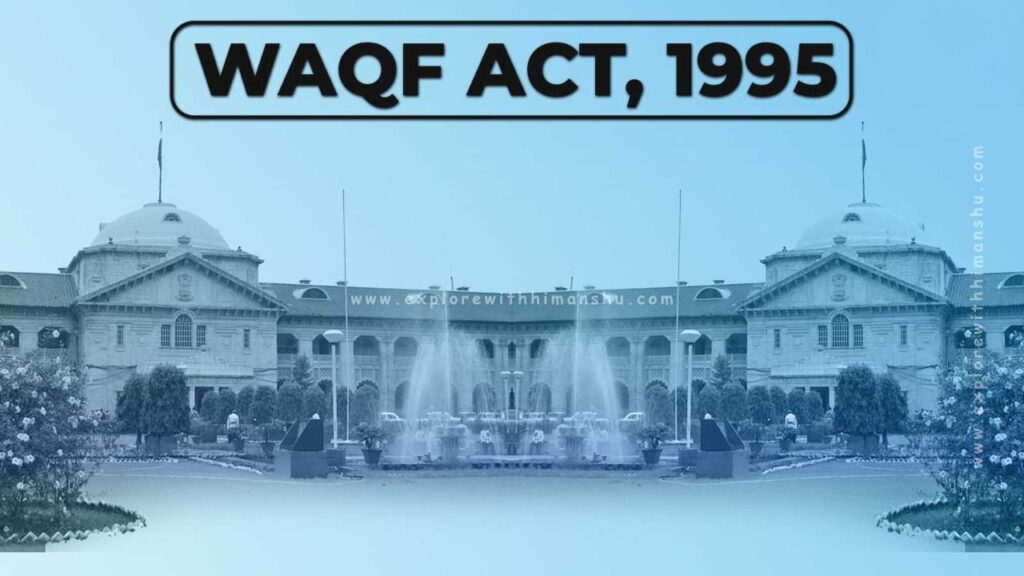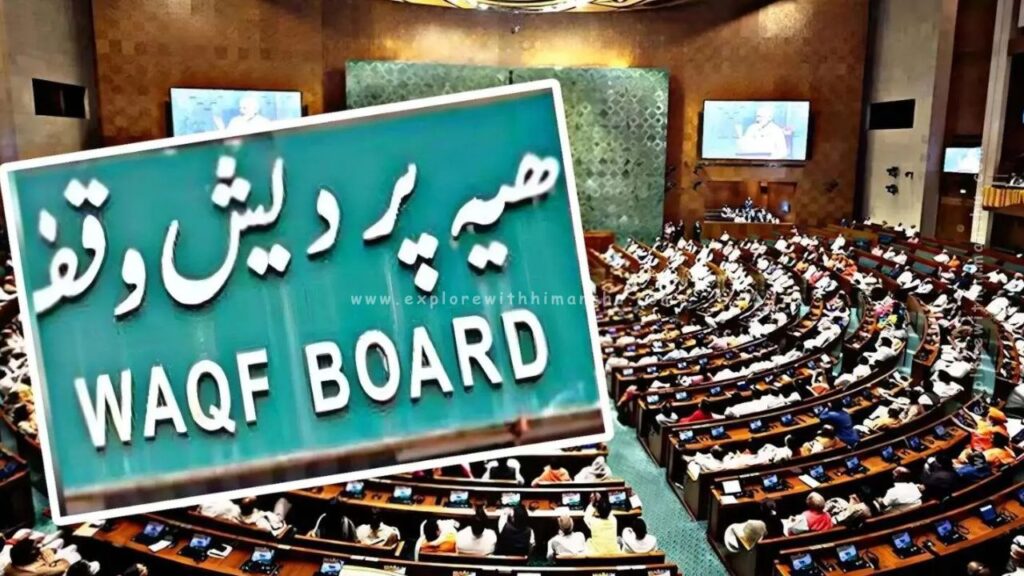Introduction
Waqf, an Islamic charitable endowment, plays a significant role in the socio-economic and religious lives of Muslims in India. Over the years, waqf properties have contributed to education, healthcare, religious services, and welfare initiatives for the marginalized. However, governance of waqf has remained fraught with mismanagement, encroachments, corruption, and political interference. The Waqf Act and its subsequent amendments were aimed at improving administration, but they also sparked debates over constitutional rights, land ownership, and minority rights.
Explore the Waqf Bill in India with this in-depth blog covering its history, key provisions, controversies, reforms, and impact on governance and the Muslim community.
The purpose of this comprehensive blog is to delve into the Waqf Bill in India—its origin, evolution, key provisions, controversies, and implications for the Muslim community and Indian polity.
ABOUT :- My Digital Marketing E-Book is a complete guide covering SEO, social media, paid ads, and lead generation. Whether you’re starting an online business or freelancing, this e-book is perfect for you. Get it now and upgrade your skills! 🚀📚
Get It Now :- Digital Marketing E-books

Understanding Waqf: Concept and Origin
In Islamic jurisprudence, ‘Waqf’ (plural: Awqaf) refers to the permanent dedication of property—movable or immovable—for religious, pious, or charitable purposes. Once declared as waqf, the property cannot be sold, inherited, or transferred. It is managed by a ‘mutawalli’ or trustee, and the benefits are intended for the public or specific groups such as the poor, students, or religious institutions.
The origin of waqf dates back to the Prophet Muhammad’s era when properties were set aside for the welfare of the needy. Over centuries, the institution of waqf evolved to become a powerful means of community development and social security in Muslim societies.
Historical Background of Waqf in India
Waqf arrived in India with Muslim rule. During the Delhi Sultanate and Mughal periods, kings and nobles donated vast lands to mosques, madrasas, and dargahs. The British colonial administration recognized waqf under the Muslim Personal Law and established waqf boards to regulate these institutions.
The Bengal Waqf Act of 1934 was the first statutory intervention in British India, followed by the Central Waqf Act in post-independence India. The management and preservation of waqf properties became a critical concern, especially given rampant encroachments and illegal transfers.
The Bright Future of EV Cars: Innovations and Trends Shaping 2025
Legal Framework of Waqf
The legal structure governing waqf in India includes:
- Muslim Personal Law (Shariat) Application Act, 1937
- Waqf Act, 1954 (repealed)
- Waqf Act, 1995 (current principal legislation)
- Waqf (Amendment) Acts of 2013 and other years
- State-specific waqf regulations
These laws govern the creation, administration, and protection of waqf properties. The Central Waqf Council and State Waqf Boards are the key statutory bodies.

The Waqf Act, 1995
The Waqf Act of 1995 consolidated earlier waqf laws and aimed to improve accountability and transparency. Key features include:
- Establishment of Central and State Waqf Boards
- Registration of all waqf properties
- Appointment of CEO and staff for waqf boards
- Maintenance of waqf property records
- Provisions for removal of encroachments
Despite these provisions, implementation challenges persisted, particularly due to lack of resources, political pressure, and bureaucratic delays.
Amendments to the Waqf Act
The Act was amended several times to address emerging issues:
- 2010 Amendment: Enhanced penalties for encroachment and allowed CBI investigation.
- 2013 Amendment: Strengthened the powers of Waqf Boards, mandated registration of waqf properties, and introduced online management systems.
- Recent Developments: Several states have called for new amendments to curb misuse and ensure better monitoring.
These changes have had mixed impacts—improving digital record-keeping but also raising concerns over overreach and property disputes.
Key Provisions of the Waqf Bill
Recent iterations of the Waqf Bill focus on:
- Digitization of waqf records
- Transparency in mutawalli appointments
- Time-bound inquiry for disputes
- Anti-encroachment drives
- Accountability mechanisms for Waqf Boards
The Bill empowers Waqf Boards with quasi-judicial powers but critics argue this may lead to misuse.
Powers and Functions of Waqf Boards
Waqf Boards are responsible for:
- Surveying and registering waqf properties
- Appointing and monitoring mutawallis
- Preventing and removing encroachments
- Auditing accounts and ensuring proper utilization
- Recommending criminal action in case of violations
Their powers are often hindered by lack of funds, political interference, and outdated property records.
Land Encroachments and Waqf Properties
One of the biggest threats to waqf assets is illegal encroachment. Thousands of acres of waqf lands across states like Maharashtra, Uttar Pradesh, and Karnataka have been encroached upon by private parties, government agencies, and real estate mafias.
The Waqf Bill proposes stringent actions against encroachers, including penalties and criminal proceedings, but implementation remains a hurdle.
Case Studies: Waqf Land Disputes
Some major waqf property disputes include:
- Mumbai’s Ameen Baug land case
- Delhi’s Ajmeri Gate encroachments
- Hyderabad’s Dargah land litigations
These disputes often take decades to resolve, leading to financial losses and community unrest.
Challenges Faced by Waqf Institutions
- Lack of proper documentation
- Political interference
- Corruption and mismanagement
- Encroachment and illegal sales
- Poor capacity and awareness among mutawallis
- Weak legal enforcement
These issues undermine the potential of waqf as a developmental tool.

Reforms Proposed in the Waqf Sector
Experts have suggested:
- Professional training for waqf staff
- GIS mapping of waqf properties
- Transparent leasing and rent collection
- Public-private partnerships for development
- Independent audit and vigilance mechanisms
Criticisms and Controversies
- Allegations of waqf boards acting arbitrarily
- Fear of land grabbing in the name of waqf
- Accusations of vote-bank politics
- Discontent among other religious groups over perceived favoritism
Such criticisms often fuel communal tensions.
Socio-Political Impact of the Waqf BillThe Bill has major implications:
- Enhances Muslim representation and voice in governance
- Affects urban planning and land use policies
- Shapes minority welfare schemes
- Becomes a point of political contest during elections
Waqf Laws in Other Countries
Countries like Turkey, Egypt, Malaysia, and Saudi Arabia have modern waqf systems with government oversight, digital records, and community involvement.
- Turkey: State-administered waqfs through Directorate General of Foundations
- Malaysia: Centralized waqf management with corporate models
- Egypt: Ministry of Awqaf oversees administration
Comparative Analysis: India vs Other Nations
India’s waqf system is more decentralized but suffers from weak enforcement. Compared to the corporate-style management in Malaysia or Turkey, India’s model lacks financial innovation and institutional capacity.
Perspectives from the Muslim Community
The Muslim community is divided:
- Some see the Bill as a protective mechanism
- Others view it as a tool of control and surveillance
- Many call for greater autonomy and transparency in decision-making
Government’s Role and Accountability
The government must:
- Ensure unbiased administration
- Prevent communal exploitation
- Strengthen institutional support
- Protect waqf land from illegal acquisition
Way Forward and Recommendations
- Digitize all waqf records and maps
- Professionalize waqf board management
- Enhance community participation
- Encourage inter-faith dialogue
- Create fast-track courts for waqf disputes
Conclusion
The Waqf Bill, while a step toward reform, must be approached with sensitivity, inclusiveness, and transparency. A robust waqf system has the potential to empower the marginalized, preserve cultural heritage, and foster communal harmony. Genuine reforms, backed by political will and community engagement, can unlock waqf’s transformative power for India’s diverse society.


